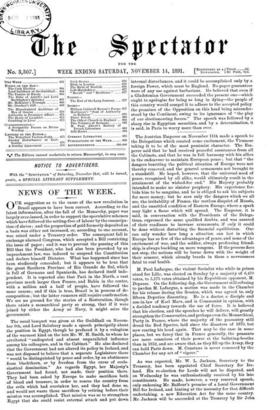The Austrian Emperor on November 11th made a speech to
the Delegations which created some excitement, the Viennese taking it to be of the most pessimist character. The Em- peror said that be had received peaceful assurances from all the Cabinets, and that he was in full harmony with his allies in the endeavour to maintain European peace ; but that " the dangers besetting the political situation of Europe were not thereby removed, and the general armaments not brought to a standstill. He hoped, however, that the universal need of peace, recognised by all alike, would ultimately result in the attainment of the wished-for end." His Majesty probably intended to make no sinister prophecy. His experience for- bids him to be sanguine, and be is obliged to ask his subjects for more money; but be sees only the dangers which we all see, the irritability of France, the restless disquiet of Russia, and the unsettled condition of Eastern Europe, where a spark may light a flame which will spread. The Emperor, it is said, in conversation with the Presidents of the Delega- tions, expressed the same qualified doubts, and was assured of their readiness to increase armaments, if only it could be done without disturbing the financial equilibrium. One can only wonder how long a situation can last in which Europe has so few of the advantages of peace, and none of the excitement of war, and the soldier, always professing friend- ship, is always buckling on more weapons. If the process does not stop, the nations will be borne down with the weight of their armour, which already breeds in them a nervousness fatal to real health.






































